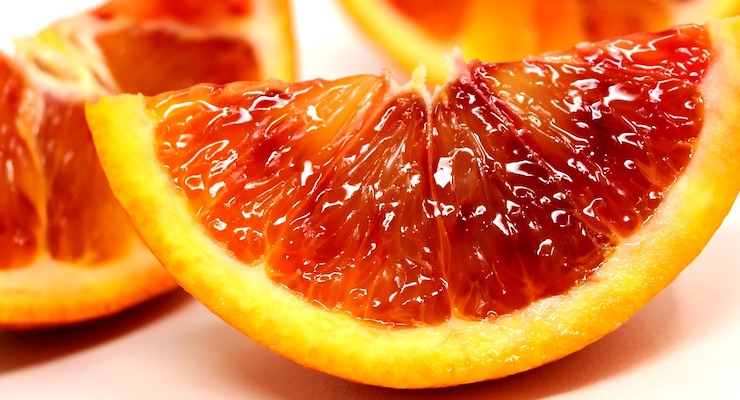03.22.22
An extract of Moro blood orange marketed as Morosil by Bionap may improve the weight loss and BMI benefits of calorie-restriction and exercise, according to a new double-blind, placebo-controlled clinical study published in Nutrients. Moro blood oranges, a specific cultivar of the fruit, are considered to have the highest amount of anthocyanins, particularly cyanidin 3-glucoside.
“This recent clinical study further showed the weight loss benefits of Morosil along with its ability to assist in body composition changes,” Andrea Bonina, managing director for Bionap, said. “There was a significant decrease in abdominal, visceral, and subcutaneous fat mass, while the lean muscle mass was kept constant.”
In the study, 98 overweight but otherwise healthy male and female participants received either 400 mg of a Moro blood orange standardized extract or a placebo for 6 months, while also completing calorie counting in order to restrict their diets. Both groups in the study reported approximately the same amount of exercise during the 6 months of the trial, according to the authors, measured as a number of 30-minute sessions completed per week.
The authors of the study reported that the mean overall weight loss of the supplement group was -4.2%, compared to an overall weight loss of -2.2% seen in the placebo group by the end of the study period. Additionally, 36% of the participants in the active group had a weight loss of more than 5%, versus 22.5% of the participants in the placebo group. A significant difference in weight loss between the two groups was first observed at month four.
Furthermore, at 6 months, the supplementation group experienced a significant reduction in BMI compared to the placebo group, which was assessed via a DXA scan. This included significant differences between the two groups in total BMI, hip circumference, waist circumference, fat mass, and fat distribution (visceral vs. subcutaneous fat).
While adherence to the diet and exercise program was not firm among the participants, the authors of the study said that both groups had equivalent adherence to the prescribed protocol.
“In the present study, ‘Moro’ blood orange standardized extract, in conjunction with diet and exercise, was shown to be safe and well tolerated,” the authors of the study concluded. “The secondary metabolites present in the active ingredient by regulating lipid metabolism through fatty acid biosynthesis and oxidation promoted increased weight loss and reduced waist and hip circumference in overweight but otherwise healthy male and female participants compared to placebo. As reported by the scientific literature, this effect is probably linked with the activity and modulation at the gene level exerted by the phytocomplex in a combined way.”
“This recent clinical study further showed the weight loss benefits of Morosil along with its ability to assist in body composition changes,” Andrea Bonina, managing director for Bionap, said. “There was a significant decrease in abdominal, visceral, and subcutaneous fat mass, while the lean muscle mass was kept constant.”
In the study, 98 overweight but otherwise healthy male and female participants received either 400 mg of a Moro blood orange standardized extract or a placebo for 6 months, while also completing calorie counting in order to restrict their diets. Both groups in the study reported approximately the same amount of exercise during the 6 months of the trial, according to the authors, measured as a number of 30-minute sessions completed per week.
The authors of the study reported that the mean overall weight loss of the supplement group was -4.2%, compared to an overall weight loss of -2.2% seen in the placebo group by the end of the study period. Additionally, 36% of the participants in the active group had a weight loss of more than 5%, versus 22.5% of the participants in the placebo group. A significant difference in weight loss between the two groups was first observed at month four.
Furthermore, at 6 months, the supplementation group experienced a significant reduction in BMI compared to the placebo group, which was assessed via a DXA scan. This included significant differences between the two groups in total BMI, hip circumference, waist circumference, fat mass, and fat distribution (visceral vs. subcutaneous fat).
While adherence to the diet and exercise program was not firm among the participants, the authors of the study said that both groups had equivalent adherence to the prescribed protocol.
“In the present study, ‘Moro’ blood orange standardized extract, in conjunction with diet and exercise, was shown to be safe and well tolerated,” the authors of the study concluded. “The secondary metabolites present in the active ingredient by regulating lipid metabolism through fatty acid biosynthesis and oxidation promoted increased weight loss and reduced waist and hip circumference in overweight but otherwise healthy male and female participants compared to placebo. As reported by the scientific literature, this effect is probably linked with the activity and modulation at the gene level exerted by the phytocomplex in a combined way.”




























